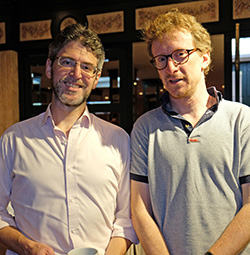 Brian Honermann, amfAR (left), and Esteban Burrone, Medicines Patent PoolThis past October, advocates and intellectual property experts who work toward improving access to essential medicines for HIV, hepatitis C, and tuberculosis gathered in Bangkok to discuss “essential standards” for voluntary licenses. A voluntary license is an arrangement whereby a patent holder may allow others to manufacture, import, and/or distribute its patented drug.
Brian Honermann, amfAR (left), and Esteban Burrone, Medicines Patent PoolThis past October, advocates and intellectual property experts who work toward improving access to essential medicines for HIV, hepatitis C, and tuberculosis gathered in Bangkok to discuss “essential standards” for voluntary licenses. A voluntary license is an arrangement whereby a patent holder may allow others to manufacture, import, and/or distribute its patented drug.
Organized by amfAR’s Public Policy Office and TREAT Asia, the consultation brought together 18 participants from 11 countries in Asia, Europe, Africa, and North America, representing 15 local, national, regional, and international organizations.
“Voluntary licenses can be an important tool in expanding access to medicines when implemented well,” said Brian Honermann, Deputy Director, amfAR Public Policy Office. “However, they can also prove worthless if the terms are insufficient to genuinely guarantee greater access.”
We need to make sure that everyone can get the drugs they need for HIV and all diseases for which there is a treatment. “While voluntary licenses should improve access to essential medicines, in some cases they can actually impede access,” said consultation participant Chalermsak Kittitrakul of AIDS Access Foundation in Thailand. “Some voluntary licenses exclude certain countries from the agreement. Some have clauses such as royalty rates that require generic licensees to pay a high fee to the originator company, and tiered pricing, which lets license providers fix a certain price for countries depending on their income level. Voluntary licenses can also be abused to control the generic pharmaceutical industry and the active pharmaceutical ingredient (API) supply sources. This prevents the prices for the generic drugs from being as low as they should be.”
Participants are aiming to develop essential standards against which voluntary license agreements should be assessed. For example, the terms of a voluntary license must be fully transparent. Voluntary license offers need to include all essential medicines patented by the originator company, not just certain classes or for certain diseases. For instance, HIV and hepatitis C drugs have been made available through voluntary licenses. However, very expensive cancer medications have not generally been made available to countries through such licenses (although a new agreement, not involving a license, will provide steeply discounted prices for cancer medicines to Africa). Country inclusion or exclusion criteria need to be stated in a voluntary license, so that such terms can be appealed if they do not take into account disease burden, or they cause disproportionate harm to low-income individuals.

Participants of the Consultation on Voluntary Licenses: Civil Society Demands and Proposals, Bangkok, October 16–17, 2017. From left to right: Kenneth Mwehonge, Coalition for Health Promotion and Social Development (HEPS Uganda); Safiatou Simpore, YOLSE, Public Health & Innovation, Uganda; Tapiwa Kujinga, PAN-AFRICAN Treatment Access Movement, Zimbabwe; Zhenyan Zhu, Third World Network, China; Priyam Cherian, Lawyers Collective, India
The consultation also agreed that mechanisms need to be in place to inform countries whether or not they are being included in voluntary licenses, and that patent-holding entities have a responsibility to ensure genuine access that goes beyond the establishment of a voluntary license.
“In the coming months, we’ll continue to hold workshops and further the discussion on essential standards for voluntary licenses that will push pharmaceutical companies to more deeply engage with the access-to-medicines community,” said Mr. Honermann. “We need to make sure that everyone can get the drugs they need for HIV and all diseases for which there is a treatment.”